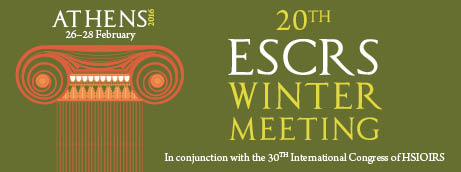Posters
(results will display both Free Papers & Poster)
Vernal keratoconjuctivitis in children resistant to usual topical treatment: is topical cyclosporin 0.05% an effective choice?
Poster Details
First Author: O.Gkorou GREECE
Co Author(s): E. Koulali M. Banteka P. Kalouda G. Sakkias
Abstract Details
Purpose:
Vernal keratoconjuctivitis (VKC) is a recurrent bilateral disorder in which both IgE- and cell-mediated immune mechanisms play important roles. It primarily affects boys and onset is from about the age of 5 years onwards. Its management often requires intensive and prolonged treatment. Our purpose is to report the efficacy of topical cyclosporine A 0.05% (Restasis) in 3 cases of children with VKC resistant to antihistamines/mast cell stabilizers and steroids topical therapy
Setting:
Department of Ophthalmology, ‘’Hippokrateion’’ General Hospital of Thessaloniki, Thessaloniki, Greece
Methods:
1 boy and 2 girls, 7-9 years old, presented to the outpatient clinic of our hospital due to symptoms of intense itching and photophobia in both eyes, discharge, tearing, a foreign body sensation, burning and increased blinking, accompanied with head tilted downwards and therefore serious social impact in school. The symptoms were persistent for four months after continuous topical antihistamines/mast cell stabilizers and steroids therapy. There was not any past ocular and medical history. The ocular examination revealed conjuctival hyperemia, papillary hypertrophy, superior punctuate epithelial corneal erosions, subepithelial corneal scars and Trantas dots.
Results:
Each patient received topical cyclosporine A four times daily in addition to artificial tear ointment and chromoglycate eye drops four times daily and dexamethasone eye drops three times daily .Within the first 15 days, an impressive decrease in both signs and symptoms was noticed and no significant side effects were observed. The head tilt had disappeared .The dosage of the steroids decreased to two times daily, the rest of the therapy remained the same and weekly monitoring was suggested.
Conclusions:
These cases suggest that topical cyclosporine therapy, as a combination therapy with topical steroids in children with severe disease not responding to antihistamines/mast cell stabilizers and steroids topical therapy,is a very promising treatment option for controlling the symptoms and signs of VKC in children and should always be considered in such cases. FINANCIAL DISCLOUSRE: NONE


